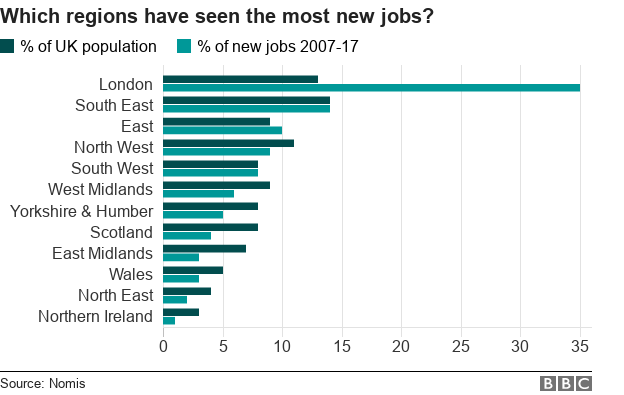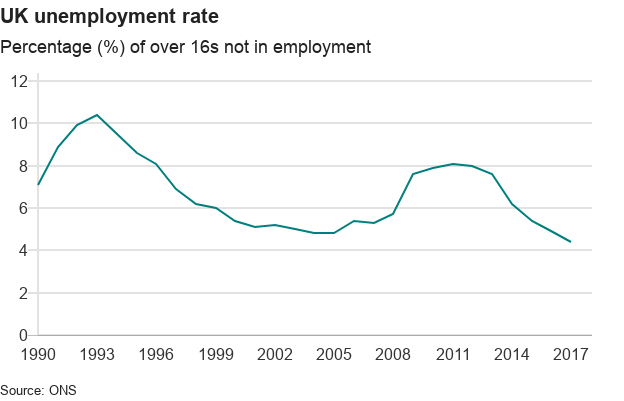London dominates UK jobs growth over past decade
- Published
Nyheke Lambert says her business "would only work in London"
One in three new jobs created in the UK over the past decade has been in London, analysis shows.
Employment has been rising across the country but by far the strongest growth has been in the capital, according to official employment statistics.
Labour said its proposals would rebalance the economy away from south-east England.
The UK Government said it was committed to boosting local growth outside of London.

The BBC's Shared Data Unit analysed official labour market figures from the Office for National Statistics (ONS) from 2007-2017. It found:
London's job creation rate outstrips its high population growth. Of the 2.7 million new jobs, almost 950,000, or 35%, were created in the capital
The north-east of England saw the lowest percentage increase in new jobs of any UK region or nation, along with the lowest population increase
More than half of jobs in London and the South East are now classed as skilled professional occupations
In the north-east of England and Northern Ireland, the proportion of skilled professional jobs drops to 39% and 36% respectively

'I needed to be among the greatest'

Nyheke Lambert moved to London to start her own business
London has long attracted young people looking to break into the city's established creative industries.
Nyheke Lambert, 28, is a seamstress and pattern cutter, originally from Birmingham. She moved to London to start her business in order to be closer to potential clients.
"I needed to be among the greatest of the greatest.
"There just isn't the demand in Birmingham. Even when I was living there and freelancing, all of my clientele was in London - so I was still visiting every week for fittings.
"My life is in London now. The major downside is that it is very expensive. The cost of accommodation and renting a space for your business is extortionate. If you don't have investors or savings to fall back on, you are going to struggle."

'London versus the Rest'
Total employment in the UK has risen steadily over the last decade, with an average of 32 million people in work in 2017 - the most recent year for which full statistics are available.
London was already the UK's most economically productive region before the 2008 financial crisis. It has since strengthened that position.
"What is more important than ever is access to knowledge, skills, ideas and high-skilled workers and London has that in abundance," said Naomi Clayton, policy and research manager at the Centre for Cities think tank.
"It relates to the story of the North-South divide and London versus the Rest, which has been around a very long time. If anything, given the structural changes taking place in the economy in terms of globalisation and automation, those forces are working to widen the divide."

Tony Wilson, director of the Institute of Employment Studies, described London as a "jobs machine".
"The areas of the economy in which London has been historically strong are areas which have seen very strong growth in the last decade," he said.
"The UK is even more of a services-based economy now than it was 10 years ago. Regions which have been more reliant upon non-service sectors - such as manufacturing or construction - have done relatively less well."
Employment in Wales grew by 6% over the period, while its population grew by 4% - the second lowest total of any UK nation or region behind the North East.
The number of people in employment in Scotland has risen four per cent in the past decade, while its population increased by 4.7%.

'I was terrified of leaving my job'

Sara West previously worked in the public sector in County Durham
Employment in the north-east of England grew by 2.5% over the last decade, the slowest rate of any UK region or nation.
The number of workers in the region employed in care or leisure work, customer service or sales roles, rose to one in five by 2017, the highest rate in the country.
Sara West, 52, runs a business that hosts murder mystery weekends. She formerly worked in the communications department of Stockton-on-Tees Borough Council.
"Leaving my job was terrifying," she said. "I was leaping out of a secure permanent position to set up my own business.
"I wasn't necessarily confident about creating my own work, but it had reached the point that if I didn't try then I wouldn't know.
"If I couldn't do what I'm doing know, I think I would probably find myself in a minimum wage job.
"Because I'm now in my 50s, I don't think I would find such good employment again."

Total unemployment fell in August to 1.36 million - a rate of 4% and the lowest figure for more than 40 years.
The UK Government has said the high employment rate was proof its economic policies were working. Following the 2018 Budget, Liz Truss, the Chief Secretary to the Treasury, spoke of a "real jobs miracle in this country".
But Professor Christopher Warhurst, director of the Warwick Institute for Employment Research, said companies were providing too many low-skilled, low-wage jobs.
"One thing the UK Government could do is what we call 'paving the high road' by creating not just more jobs, but better jobs," he said.
"UK Governments of all stripes have said in times of crisis that what we need are any jobs - but such employment has never been sustainable.
"Theresa May has said she understands ordinary people's problems. If she does, she needs to start blocking off the low road and start paving the high road."

London has witnessed a jobs boom in the last decade
Both Labour and the Conservatives have revealed policies which they claim will boost growth in regions outside of London.
John McDonnell MP, Labour's shadow chancellor of the exchequer, said: "The Tories' mismanagement of our economy has been underpinned by workplace insecurity and low pay.
"Labour's proposals to rebalance the economy away from the South East include a network of Regional Development Banks, an ambitious industrial strategy, £250bn of government capital investment over ten years to upgrade Britain's physical infrastructure and a Community Wealth Building programme to learn from councils like Preston how to support local economies."
A spokeswoman for the UK government said: "Since 2010, employment has risen in every region of the UK with 3.3 million new jobs, 90% of which were filled by UK nationals and three quarters were in permanent, full-time and high skilled roles.
"We are committed to boosting local growth outside of London which is why we have invested half a billion pounds into the Northern Powerhouse, and up until 2020 we are investing £250m in coastal communities to provide thousands of jobs, training places and new economic opportunities."

More about this story
The Shared Data Unit makes data journalism available to news organisations across the media industry, as part of a partnership between the BBC and the News Media Association. This piece of content was produced by local newspaper journalists working alongside BBC staff.
For more information on methodology, external, click here. For the full dataset, click here, external.
- Published27 November 2018

- Published26 November 2018

- Published21 November 2018

- Published16 October 2018
